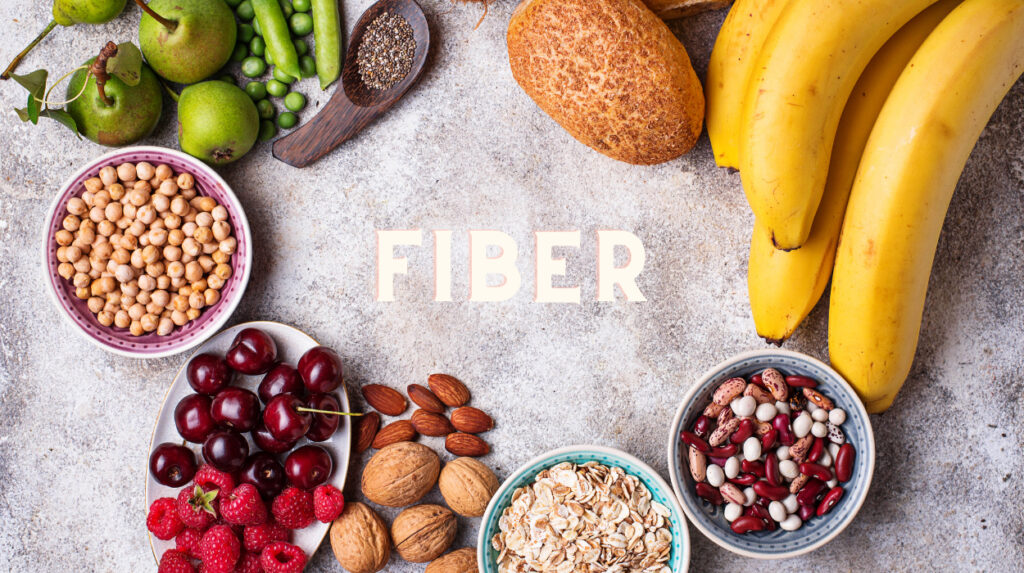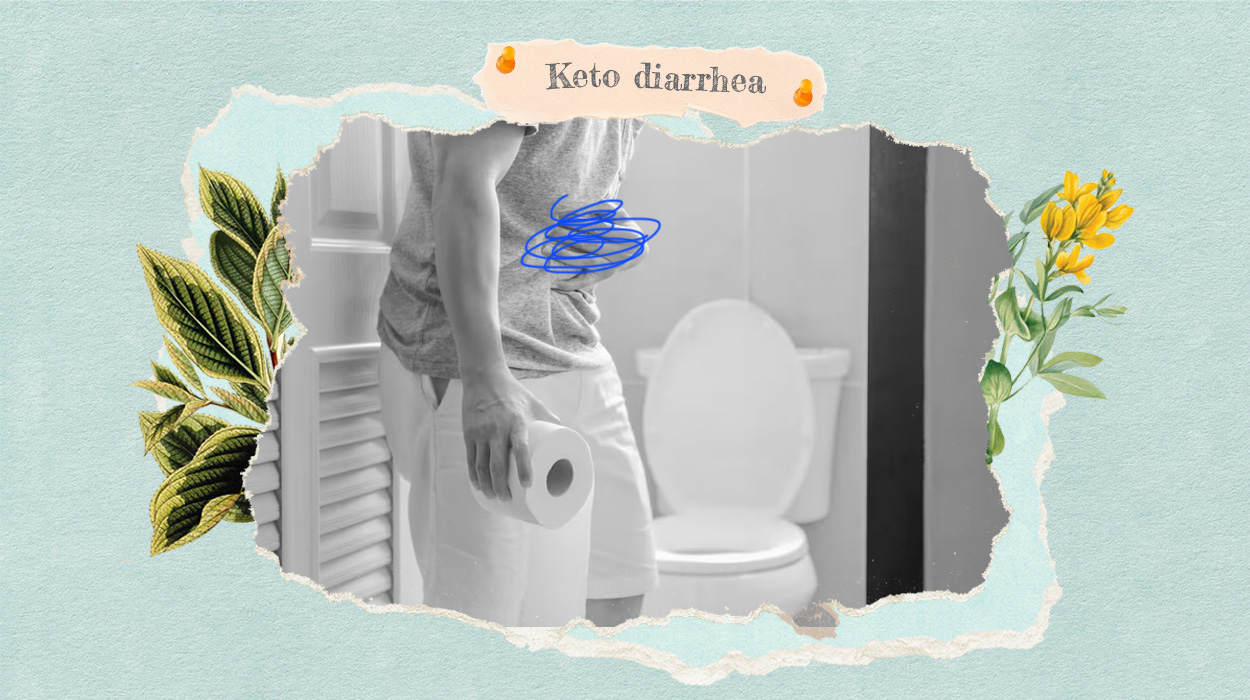Discover the truth about keto diarrhea. Read on to learn the causes, remedies, and how to maintain a healthy gut on a low-carb diet in 2024.The ketogenic diet has been trending recently for its potential weight loss, as well as its brain function and metabolic health benefits. Characterized by a significant reduction in carbohydrates, the keto diet emphasizes fats, prompting the body to use fat as its primary energy source.
As with any dietary shift, the keto diet can come with unexpected challenges. Keto diarrhea is a common complaint among individuals. Luckily, there are several remedies to help. Individuals can limit artificial sweeteners, gradually transition, and use probiotics or digestive enzymes to stop keto diarrhea.
Let’s dive deeper into the causes of keto diarrhea. We’ll discuss crucial ways to navigate the keto diet’s initial challenges so you can succeed in your keto journey.
Does Keto Cause Diarrhea?
- Keto diarrhea typically arises due to the drastic low-carb and high-fat changes in diet composition for those following the keto diet.
- The keto diet can alter the balance of gut bacteria. Since the gut microbiome is pivotal in digestion, changes in gut bacteria can influence bowel habits.
- Many keto-friendly products use sugar alcohols as sweeteners. These can have a laxative effect when consumed in large amounts.
- Consuming more fiber, integrating fermented foods, and considering a probiotic supplement can help balance the gut bacteria and alleviate diarrhea. Consult a physician if symptoms persist or are accompanied by other gastrointestinal issues.
What Is Keto Diarrhea?
Keto diarrhea is a common gastrointestinal issue experienced by some individuals when transitioning to a ketogenic diet. The keto diet is a low-carbohydrate, high-fat diet designed to shift body metabolism from glucose to ketones as its primary energy source.
Ketones are organic compounds produced by the body as an alternative energy source when glucose is in short supply. They are formed in the liver from fat breakdown and sent into the bloodstream for energy by your cells. The process occurs during fasting, intense exercise, or following the keto diet.
Featured Partner Offer

Colon Broom
- Reduces bloating and relieves constipation
- Improves general gut health
- Increases fiber intake
- Supports healthy cholesterol levels
- Promotes healthy circulation
Smooth Diet Transition
Many choose the keto diet for weight loss, improved mental clarity, and better blood sugar control.Understanding the potential side effects can help you make informed decisions about dietary adjustments to ensure a smooth, symptom-free transition.
Identifying Underlying Issues
Recognizing the causes of low-carb diarrhea can help identify underlying digestive or metabolic issues. In some cases, these issues need to be addressed immediately by a healthcare provider. For example, if you have a gallbladder issue or fat malabsorption, you may need to approach a high-fat diet differently for your safety.
Dietary Adjustments
Since sudden changes to your diet can impact gut flora and overall digestive health, it’s essential to make gradual changes. Incorporating probiotics to protect your gut health helps adjustments in diet.
Avoid Health Risks
Chronic diarrhea can lead to health risks such as dehydration, electrolyte imbalance, and other health complications. Being informed about diarrhea on keto allows prompt action for GI symptoms.
Although many individuals experience diarrhea during the initial keto phase, it typically resolves as your body adjusts. However, persistent diarrhea and other gastrointestinal symptoms require consultation with your healthcare provider.
Causes Of Keto Diarrhea
Although experiencing keto diarrhea is common, it occurs for various reasons:
Changes In Diet Composition
Many individuals dive right into the keto diet full force. Abrupt reduction in carbohydrates and increases in dietary fats cause digestive issues. Digesting more fats requires increased bile release, which increases intestinal transit time, accelerating bowel movements, causing diarrhea.
Reduction In Fiber
Many new keto dieters inadvertently reduce fiber. You’re also decreasing your fiber intake by eliminating carb-rich foods like whole grains and certain fruits. Fiber is pivotal in bowel regularity; this sudden change can disrupt your digestive rhythms.
Increase In Artificial Sweeteners And Sugar Alcohols
Keto-friendly sugar substitutes frequently use sugar alcohols, such as erythritol and xylitol. These products can have a laxative effect[6] when consumed in larger quantities. Ultimately, this may add diarrhea symptoms. Additionally, erythritol has recently been implicated as increasing risk of heart attack.
Gut Flora Changes
The gut microbiome is the ecosystem of healthy bacteria in our intestines. Gut flora thrive on various diets, differing among individuals. A sudden shift from carbs can alter bacterial balance and cause digestive disturbances like diarrhea.
Fat Malabsorption
Only some people can effectively process excessive fat intake. For some individuals, fats aren’t adequately absorbed. In these cases, unabsorbed fat remains in the intestines causing loose and greasy stools.
Gallbladder Response
One of the main functions of the gallbladder is to store bile, which is secreted into the intestines for fat digestion. A sudden increase in dietary fat can stimulate more bile release, resulting in diarrhea. Understanding the cause of diarrhea will help alleviate it.
How To Stop Keto Diarrhea
There are several strategies to alleviate keto diarrhea:
Gradual Transition
This is the most important strategy. Many individuals have an all-or-nothing mindset when dieting. Instead of suddenly switching, consider making gradual changes. Reduce your carbohydrate intake slowly and increase your fat intake gradually for your digestive system to adjust.
Monitor Fat Intake
As you start the keto diet, extremely high fat intake is common. Consuming high amounts of fat can disrupt the digestive system. Instead, consider slowly increasing it as your body adjusts.
Incorporate Fiber

Ensuring enough fiber is crucial to your gut health. Consider fiber supplements to keep a healthy balance in the gut microbiome. You can also incorporate high-fiber foods and keto-friendly foods into your daily food plan. Broccoli, cauliflower, spinach, chia seeds, and flaxseeds are all excellent sources of fiber that align with your keto diet.
Add Probiotics And Digestive Enzymes
Consider taking a probiotic supplement to support a balanced gut microbiome. Adding keto-friendly probiotic foods to your daily intake can also help incorporate healthy gut bacteria. Consider adding fermented foods like kefir, sauerkraut, kimchi, or pickles to your meals. You can also add gut-healing foods and drinks like kombucha.
Stay Hydrated

Diarrhea leads to dehydration. Drink plenty of water. Take advantage of electrolyte support or consume keto-friendly broths to replenish lost minerals.
Avoid Dairy
Dairy is a staple of the keto diet. However, some people may find they are more sensitive to dairy in larger quantities. Consider reducing dairy if you experience keto diarrhea.
Consult A Healthcare Professional
It’s essential to contact a healthcare professional if diarrhea persists or is accompanied by other concerning symptoms. Your doctor can give you customized guidance on how to stop diarrhea. They can also help rule out other potential causes.
Other Side Effects Of Keto
The keto diet has a range of different side effects. These are particularly common during the initial transition as your body adjusts. Here are some other keto side effects:
Keto flu symptoms including headache, fatigue, nausea, irritability, and dizziness.
- Difficulty sleeping.
- Muscle cramps.
- Bad breath.
- Leg pain.
- Constipation.
- Heart palpitations.
- Reduced physical stamina or strength.
- Frequent urination.
- Hunger or sugar cravings.
Although these side effects are expected during the early stages of the ketogenic diet, many resolve as your body gets used to the change. Contact your healthcare provider if they’re persistent or severe.
When To Find A Professional Help
Persistent or severe symptoms warrant immediate professional attention. Here are the symptoms indicating you should contact your healthcare provider immediately:
- Diarrhea longer than two weeks.
- Dehydration symptoms including dark urine, excessive thirst, dry mouth, fatigue, and dizziness.
- Any noticeable blood or black, tarry appearance in your stool.
- Severe stomach pain.
- Fever.
- Pre-existing digestive tract conditions such as irritable bowel syndrome, inflammatory bowel disease, or celiac disease.
Conclusion
A keto diet means embarking on a transformation that aids in weight loss and potentially benefits overall health.
Staying informed, listening to your body, and knowing when to seek expert guidance can help you navigate challenges like keto diarrhea. Remember, the path to better health is a marathon, not a sprint. You can make the most of your keto journey with patience, persistence, and the proper knowledge.
Frequently Asked Questions
For most, keto diet diarrhea is a temporary issue. It typically lasts anywhere from a few days to a few weeks.
Burning fat in and of itself does not lead to diarrhea. However, significant changes in your diet and too much fat can contribute to diarrhea.
Does keto cause diarrhea? It can be a side effect of the initial transition to keto. Since the diet aims to induce ketosis, you may experience diarrhea.
Diarrhea can result in temporary weight loss, but fluid loss is not weight loss from fat or muscle reduction.
Whoosh refers to the theory of a sudden noticeable weight loss with the keto diet after a period of stall or plateau. Therefore, keto whoosh poop is a way to describe changes in bowel habits associated with keto weight loss.

